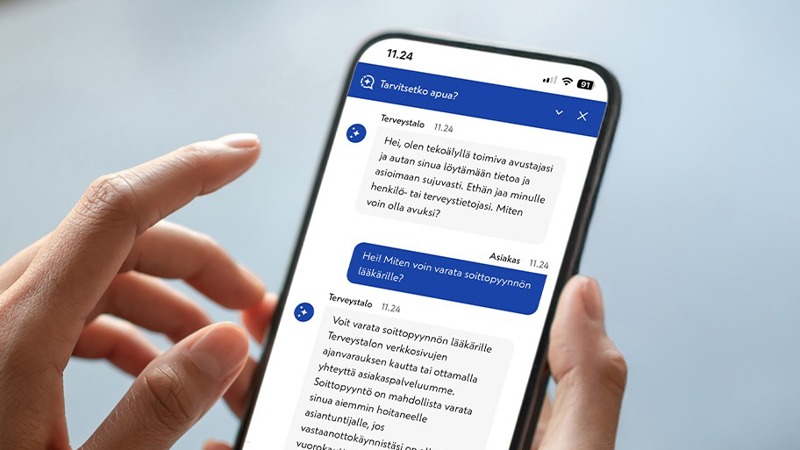Behavioral addictions have increased: "Addiction is a brain disease"
Particularly among young people, addictions to digital games and social media have increased following the COVID-19 pandemic.

Behavioral addictions are those where the core symptom is compulsive behavior.
− The activity continues even though it has harmful consequences, for example, on relationships, finances, or work life. And the more frequently the activity is performed, the stronger the addiction becomes. The most common behavioral addictions are gambling, digital gaming, and pornography addiction, explains Sami Leppämäki, Medical Director of Psychiatry at Terveystalo.
Like substance addictions, behavioral addictions also cause withdrawal symptoms.
− Withdrawal symptoms include anxiety, restlessness, and difficulty concentrating. Withdrawal symptoms can help identify the addiction itself. For example, how does it feel if you don't start your morning by scrolling through social media? Or can you stop playing a digital game in the middle? Does being on your phone cause problems in your relationship, yet you still can't reduce its use?
Behavioral addictions have increased as a result of the COVID-19 pandemic
Behavioral addictions are discussed much less than substance addictions. However, they have increased further as a result of the COVID-19 pandemic.
− Due to the COVID-19 pandemic, people isolated themselves at home, leading many to develop new addictions or worsening existing ones. Loneliness is a significant risk factor for addictions, as people try to fill that emptiness with something else.
Among young people, digital gaming is the most common addiction, according to Leppämäki.
− In my experience, digital gaming is one of the fastest-growing addictions. Social media can also be highly addictive. It can be challenging to wean off both digital games and social media because these services are carefully designed to maintain user engagement.
Addiction is a brain disease
In the brain, behavioral addictions operate through the same mechanisms as substance addictions. The diagnostic criteria are exactly the same.
− Addiction is a brain disease: it alters the brain's pleasure pathways, affecting dopamine levels. This impacts a person's behavior, motivation, and control. Addiction essentially takes control of the person, weakening their ability to make decisions in their own best interest, Leppämäki describes.
Any activity can become addictive if it provides some form of pleasure to the person.
− Tolerance often increases as well, meaning that the activity requires increasingly stronger stimuli to achieve the same pleasurable experience. For example, in gambling, the stakes get higher. But as the addiction progresses, people report less pleasure. At this stage, compulsion is driven more by the fear of withdrawal symptoms than the pursuit of positive experiences.
Addictions tend to cluster in the same individuals, and men are more prone to addictions
According to Leppämäki, susceptibility to addictions is related to genetics, mental health, and social factors.
− Addictions are more common among men, and it often involves multiple addictions: for example, substance addiction increases the likelihood of behavioral addictions. Mental health is a two-way street: research shows that depression is linked to gambling addiction, and gambling addiction to depression. Loneliness and lower income levels also increase the risk of addictions.
Behavioral addictions can be treated: the most important thing is to seek help
− The most important step is to take the first step and not face the issue alone. At home, one can explore various free guides or peer support, and then contact healthcare services. For behavioral addictions, help is available; through occupational health, we offer both low-threshold support for concerns such as gaming issues and short-term psychotherapy for treating behavioral addictions, Leppämäki explains.
Lue lisää aiheesta

What is metabolic age and why should you care about it?
A new laboratory study by Terveystalo reveals how your body is aging. Metabolic age makes biological aging visible.

Smooth assistance for your needs – our AI assistant is now at your service
You can now find Terveystalo’s AI assistant on our website — a quick and easy way to get answers based on the information available on our site. For now, the assistant is available only on the Finnish‑language section of our website, but you can chat with it in English.

How technology helps relieve mental stress: "When the load is high, the threshold must be low."
Mental health disorders have overtaken musculoskeletal disorders, which had long been the leading cause of sick leave. Work is changing, and the range of sick leave caused by mental health issues has also changed. We must be able to offer new solutions to this challenge.

Extensive data set of 200,000 samples: Nightingale study reveals link between illness risks and sick leave
Data from the Finnish Nightingale study, which is used in Terveystalo's occupational health services, reveals a clear link between lifestyle-related health risks and sick leave. The exceptionally extensive data set of over 200,000 customers shows that people with a low risk of illness had significantly fewer absences, while those in high-risk groups had more absences. The results highlight the importance of preventive healthcare in ensuring work ability and the competitiveness of companies.

Strong identification speeds up your service experience when calling us
Soon you can identify yourself easily and securely before your call is answered. Read below to see how the identification process works.

Terveystalo's digital services have been awarded the internationally recognized ISO27001 information security certification.
Terveystalo's information security practices, processes, and risk management are in line with international best practices.